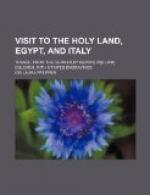On entering the town we experienced a feeling of painful emotion. Tabarith lay still half in ruins; for the dreadful earthquake of 1839 had made this place one of the chief victims of its fury. How must the town have looked immediately after the calamity, when even now, in spite of the extensive repairs, it appears almost like a heap of ruins! We saw some houses that had completely fallen in; others were very much damaged, with large cracks in the walls, and shattered terraces and towers: every where, in short, we wandered among ruins. Above 4000 persons, more than half of the entire population, are said to have perished by this earthquake.
We alighted at the house of a Jewish doctor, who entertains strangers, as there is no inn at Tabarith. I was quite surprised to find every thing so clean and neat in this man’s house. The little rooms were simply but comfortably furnished, the small courtyard was flagged with large stones, and round the walls of the hall were ranged narrow benches with soft cushions. We were greatly astonished at this appearance of neatness and order; but our wonder rose when we made the discovery that the Jews, who are very numerous at Tabarith, are not clothed in the Turkish or Greek fashion, but quite like their brethren in Poland and Galicia. Most of them also spoke German. I immediately inquired the reason of this peculiarity, and was informed that all the Jewish families resident in this town originally came from Poland or Russia, with the intention of dying in the Promised Land. As a rule, all Jews seem to cherish a warm desire to pass their last days in the country of their forefathers, and to be buried there.
We requested our young hostess, whose husband was absent, to prepare for us without delay a good quantity of pilau and fowls; adding, that we would in the mean time look at the town and the neighbouring baths at the Sea of Gennesareth, but that we should return in an hour and a half at the most.
We then proceeded to the Sea of Gennesareth, which is a fresh-water lake. We entered a fisherman’s boat, in order that we might sail on the waters where our Lord had once bid the winds “be still.” We were rowed to the warm springs, which rise near the shore, a few hundred paces from the town. On the lake all was calm; but no sooner had we landed than a storm arose—between the fishermen and ourselves. In this country, if strangers neglect to bargain beforehand for every stage with guides, porters, and people of this description, they are nearly sure of being charged an exorbitant sum in the end. This happened to us on our present little trip, which certainly did not occupy more than half an hour. We took our seats in the boat without arranging for the fares; and on disembarking offered the fishermen a very handsome reward. But these worthies threw down the money, and demanded thirty piastres; whereas, if we had bargained with them at first, they would certainly not have asked ten. We gave them fifteen piastres, to get rid of them; but this did not satisfy their greediness; on the contrary, they yelled and shouted, until the Count’s servants threatened to restore peace and quietness with their sticks. At length the fishermen were so far brought to their senses that they walked away, scolding and muttering as they went.




